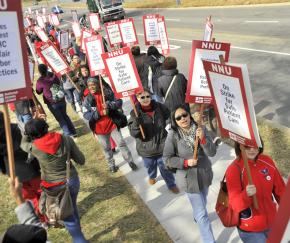One-day nurses’ strike at Washington Hospital
reports from the picket line on a battle by nurses at the Washington Hospital Center in D.C. over working conditions and patient safety.
HUNDREDS OF nurses gathered outside Washington D.C.'s largest medical facility, the Washington Hospital Center (WHC), on March 4 during a one-day strike against cuts in staffing and compensation that nurses say threaten patient safety.
But hospital management responded to the nurses' call for justice and better conditions with a four-day lockout that will prevent a return to work until March 9.
At the March 4 demonstration, the nurses, dressed in red union scrubs and carrying picket signs, blew past hospital security guards yelling "turn back" and marched right outside the hospital, where they chanted, "Hey hey, ho ho, unsafe staffing has to go!"
The 1,600 nurses at WHC, organized by National Nurses United (NNU), have reason to be angry. They have been working without a contract since last spring, and since that time, the health care nonprofit chain MedStar Health that owns the WHC has unilaterally imposed pay cuts, instituted harsh work rules and refused to address chronic understaffing. Also, before walking away from negotiations, MedStar demanded pension freezes, hikes in health care costs, and reduced shift differentials for night and weekend work.

Understaffed and overworked WHC nurses--whose duties can include managing medications, counseling, fetching water, bathing patients and cleaning bedpans--routinely resort to writing on their arms in order to accurately document medical information for mountains of required paperwork. But they better not let patient care get in the way of MedStar timekeeping--if they clock out a few minutes off their schedule, they are written up.
Deteriorating working conditions and pay cuts have led to a tremendous turnover among nurses and increasingly unsafe conditions for patients. According to the NNU, nurses have "repeatedly marched on the boss several times" to deliver 103 documented incidents of unsafe patient care since last October.
"It's a sickening feeling when you're swimming backwards and just hoping you get through the shift without an incident," said 32-year nurse and union steward Geri Lee.
AS IF remove any doubt about its priorities when it comes to patient care, MedStar announced through their spokesman-for-hire, former "Good Morning Washington" television news reporter, Matt Brock, that they planned to lock out the nurses for four days after the daylong strike on Friday, preventing a return to work until Wednesday.
Spending an estimated $1 million a day to fly in and house 300 scab nurses from across the country, MedStar apparently has money to burn when it comes to protecting their returns. The $3.8 billion "nonprofit" MedStar also pays its executives millions of dollars each year.
But if MedStar has been calling the shots up until now at WHC, on Friday, it was the nurses' turn to show their power. As frantic hospital administrators pleaded and threatened in vain to get the hundreds of fired-up nurses to move from the front of the hospital, the NNU members eventually agreed to leave a group of two dozen picketers behind, and move the bulk of the group to the main picket area.
At the main picket, hundreds of nurses from widely diverse backgrounds and nationalities continued to picket and chant as cars passed, honking in solidarity. After 90 minutes, a report came down from the hospital that the operating rooms had been all but closed by the strike. High-fives and hugs broke out as a chant started, "Who's got the power? We've got the power! What kind of power? Union power!"
At a noon rally, the crowd swelled to well over 1,000 people as the striking nurses were joined by hundreds of area union activists and community supporters. Featured speakers at the rally included AFL-CIO President Richard Trumka, U.S. Rep. Dennis Kucinich and--representing the NFL Players Association--former Washington pro football player Nolan Harrison III.
"We have called this strike because we want to ensure that this hospital is safe for our patients," argued Jesse Ruel, an emergency room nurse. "Our moral, ethical and professional responsibility is to advocate for our patients, and we intend to do just that."
AFL-CIO President Richard Trumka congratulated the nurses for their courageous stand for their rights and for their patients, and he also praised nurses for "standing together like our brothers and sisters in Madison, Cleveland and Indianapolis." Several other speakers echoed the link between the fight for workers rights across the country and the struggle at WHC.
WHC nurses plan to continue pickets each day until Tuesday evening when the lockout is expected to end. Without a contract and facing bosses who have walked away from negotiations, their struggle might not be easy, but the power they have shown over these past few days proves they can win.


